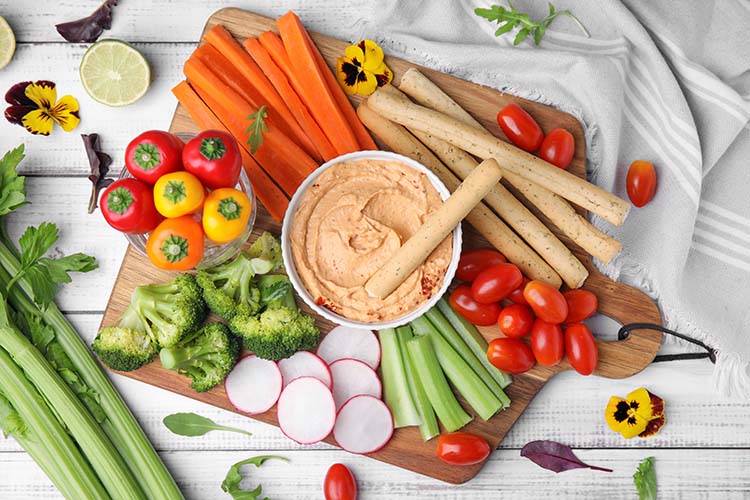The dips category expanded outside the traditional salsa and ranch choices. Today, dips can be created using a variety of vegetables, legumes and nuts as bases. Like all dips, water loves to migrate during shelf-life causing separation challenges. Though traditional stabilizers aid in water control, there are new innovative clean label solutions such as Citri-Fi® citrus fiber that can improve the texture, nutrition, labeling and stability of plant-based dips.
A party is not complete without an assortment of flavorful dips to dress up the chips. In the past, the best party hostess would fan out the traditional guacamole, salsa and ranch. But, over the years, the dip category exploded into a medley of options. As a result, party planners now can offer a variety of plant-based dips including hummus, queso and tzatziki. These vegan dips are made dairy-free using different legumes, nuts or vegetables as bases.
Though plant-based dips can simulate dairy-based dips texture, taste and shelf-life, they too come with similar challenges. For example, water loves to migrate out of foods during shelf-life. Water separation looks like pooling on the top of the dip which is not preferred amongst consumers. If the dip does not contain ingredients that naturally bind the water and/or oil, then the product risks water separation which can affect the texture and taste over time.
Conventional Stabilizers: Pros and Cons
Many of these vegan dips require stabilizers to minimize the water separation. These stabilizers range from food gums, modified starches and other plant-based fibers. However, each of these ingredients have their own pros and cons. For instance, food gums bind the water efficiently. Yet, depending on the food gum, developers run the risk of creating gummy or slimy textures. Modified starches are another common viscosifier used in plant-based dips since they are low pH and heat stable. However, they too if not used correctly, can create pasty textures.
Plant-based fibers are another popular alternative to food gums and starches. However, depending on their composition, some of them contain large amounts of insoluble fiber. Because of this, the insoluble fiber may create a gritty texture especially at higher usage levels. On the other hand, one plant-based fiber that contains equal amounts of soluble and insoluble fiber is Citri-Fi. Citri-Fi is a citrus fiber which is produced from byproduct of the citrus juicing process.
Plant-based Dips Meet Plant-based Citrus Fiber
However, not all citrus fibers are created the same. Citri-Fi is produced using a patented process free from chemical modifications. Other citrus fibers on the market are byproducts of the pectin extraction process. Though considered an upcycled product, the material typically involves solvents and possibly other chemical modifications. The Citri-Fi citrus fiber's composition is left untouched like Mother Nature intended resulting in large amounts of native intact pectin. This high pectin content gives Citri-Fi its enhanced level of functionality – water holding and emulsification. Some citrus fiber suppliers add pectin back into their citrus fiber to achieve similar functionality.
Citri-Fi citrus fiber, specifically the new 600 series, provides added viscosity. As a result, plant-based dip developers can thicken up the dip by adding less than 1% of this citrus fiber while maintaining a natural texture. Additionally, the water binding capabilities minimizes water separation over shelf life which prevents surface pooling.
Typically, Citri-Fi is mixed in with the dry ingredients before being added to liquids. However, this upcycled citrus fiber can also be dispersed in oil first before water is added. If high shear is available, Citri-Fi can be added to the water first with strong agitation. This natural food ingredient provides similar benefits to other dressings, sauces and condiments. The low pH and heat stability makes it a go-to ingredient when creating high quality food products. Citri-Fi is also non-GMO Project certified, allergen-free and gluten-free. Labeling options include citrus fiber, dried citrus pulp or citrus flour which resonate well in the natural markets. Now, the Citri-Fi 400 series, which is USDA certified organic, is available. The 400 series is ideal for organic plant-based dips.
Endless Plant-based Dip Innovations
Now that plant-based dips continue to grow in popularity due to their health halo, formulating options are endless. Dips can be made from about any vegetable or fruit. Some of the recent innovations include using cauliflower, zucchini and legumes as bases. Another hot trend is hot and spicy profiled dips. Many dips are emerging using different plant bases with a twist of chipotle, habanero or other spicy peppers. Lastly, clean label will continue to drive new product launches in this category. Many of the cheaper dips are created using a significant amount of oil and stabilizers. Keeping labeling simple and clean is on top of every consumers mind especially when it comes to any plant-based foods and beverages.


